|
|
|
Sort Order |
|
|
|
Items / Page
|
|
|
|
|
|
|
| Srl | Item |
| 1 |
ID:
170176
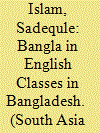

|
|
|
|
|
| Summary/Abstract |
In South Asia, the use of students’ first language while studying English as a second or further language remains a matter of considerable interest and contention. This topic deserves further attention by teachers and researchers in efforts to make the educational and learning experience in often multilingual contexts as productive as possible. This short article addresses the ongoing debates in Bangladesh around the use of the Bangla language while teaching English classes at higher secondary (HSC) level. Presently, Bangla is generally discouraged on pedagogical grounds in the teaching and learning of English. This ethnographic study investigates the attitudes of Bangladeshi HSC level students towards the use of Bangla in English classes. The results indicate positive attitudes among the students towards using Bangla in the learning of English and suggest the necessity of revising the official negative approach.
|
|
|
|
|
|
|
|
|
|
|
|
|
|
|
|
| 2 |
ID:
170178
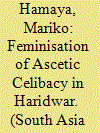

|
|
|
|
|
| Summary/Abstract |
Case studies of male–female ascetic couples in Haridwar in North India complicate the widespread knowledge that male Hindu renouncers are supposed to observe celibacy. Based on extended ethnographic work, this article investigates specifically how female ascetics tackle the dominant androcentric discourses and practise celibacy from a female point of view, focussing on their practice of sevā or spiritual service. The article argues that while female ascetics do not object to the androcentric ideology of celibacy, they follow it only partly, switching their focus from sexual abstinence to devotional sevā. Doing this, female ascetics value controlling emotion more than controlling sexual desire. Through the practice of sevā, they aim for fostering an attitude of devotion as a feminised manifestation of their efforts towards reaching spiritual attainment.
|
|
|
|
|
|
|
|
|
|
|
|
|
|
|
|
| 3 |
ID:
170177
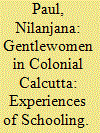

|
|
|
|
|
| Summary/Abstract |
This article shows how two pioneering institutions for female education in colonial Bengal, Bethune and Sakhawat Memorial Girls’ Schools, made significant contributions to female education at a time when women’s education was mostly restricted to home teaching. The study brings out the underlying contradictions between traditional and modern approaches towards education displayed in the goals, admission process and curriculum structure of these two schools. Analysing their respective contributions demonstrates that Bethune and Sakhawat Memorial Girls’ schools produced the modern Bengali bhadramahila (well-educated woman) who secured higher education, but was also rooted in traditional values. The final section illustrates how with the expansion of education in the twentieth century, the boundaries of the reformist zeal gradually blurred, so that educated women in Bengal could fight for greater equality.
|
|
|
|
|
|
|
|
|
|
|
|
|
|
|
|
| 4 |
ID:
170179
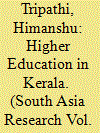

|
|
|
|
|
| Summary/Abstract |
Kerala’s advanced position in terms of literacy levels, educational achievements and other social indicators is well known. However, regarding higher education, the state displays less impressive development. The article first provides a brief overview of Kerala’s school education scenario as a base for higher education and then examines issues of access and equity related to higher education in Kerala. The findings suggest that four socio-economically backward northern districts of the state, partly facing a vicious circle of poverty and illiteracy, appear to be responsible for holding the entire state back in the rankings of present development indicators. A set of recommendations to strengthen the access and equity pillars of higher education in Kerala concludes this article, together with some comments on the relevance of vocational rather than purely academic education.
|
|
|
|
|
|
|
|
|
|
|
|
|
|
|
|
| 5 |
ID:
170180
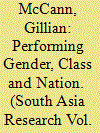

|
|
|
|
|
| Summary/Abstract |
Rukmini Devi Arundale, herself a choreographer and dancer, is considered one of the key figures in re-creating Bharatanatyam. Through her utopian arts colony, Kalakshetra, started during the movement towards Indian independence, she taught what she deemed to be a classical, religious and aesthetically pleasing form of dance. Her rejection of what she termed vulgarity and commercialism in dance reflects her Theosophical worldviews and her class position in a rapidly changing South India. The article examines the ways in which her understanding of Bharatanatyam developed in the context of contested forms of nationalism as a gender regime that contributed to creating proper middle-class, Hindu and Indian subjects. It also examines the impacts of this form of cultural heritage relating to gender, culture and nationalism in today’s globalised South Asian dance scenario.
|
|
|
|
|
|
|
|
|
|
|
|
|
|
|
|
|
|
|
|
|